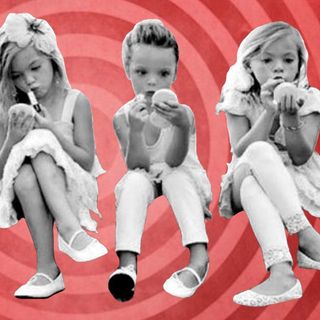
The Private Lives of India’s Singles
Quietly proving marriage and children aren’t the only paths to fulfillment.

“You don’t want to be alone when you’re old,” an eager auntie says. “Who will look after you when you get sick?” a brother-in-law adds. “But won’t you get lonely?” a married friend asks over brunch with all your friends, who are also married.
It can be tough to be single, and want to stay that way, in a culture that places so much value on the institution of marriage. Marriage is something Indians are taught to aspire to when we’re children, and this social pressure — applied by friends, family, and the media — intensifies when we reach our twenties.
But the traditional arguments for getting married, such as financial security for women, are slowly becoming invalidated, especially in urban areas. Of course, a gendered division of labor still pushes people to get married, as does pressure to continue the family name. However, in addition to all this, Indians are now being told that marriage is fundamental to leading a fulfilling life.
But is it? Or is it possible to find fulfillment outside of marriage? Plenty are staying single to find out, even if it means growing old alone. Globally, more people than ever before are single, and India has seen an increase in both single men and women over the past few decades.
Lifelong singles like Suresh Venkat are making a different kind of commitment: a commitment to not getting married. Venkat, who is a 47-year-old media consultant, anchor, and actor, came from a traditional Bangalorean family. His two older brothers were married in their 20s.
“Like most South Indian parents, my parents were keen that I too get married and ‘settled down’ towards my late 20s/early 30s,” says Venkat. “I had a serious chat with them in my early 30s that I had decided to stay single for the rest of my life and they more or less understood and respected that decision.”
Venkat says his decision to stay single was the result of an epiphany he had in his 20s, when he realized he was probably “relationship-incompetent.” He stopped entering serious relationships by his early 30s, and hasn’t looked back since. “I completely and utterly love being single. I like all aspects of the single life,” says Venkat. “I like having my own house to myself and the freedom to buy or not buy anything that my heart desires without having to check with anybody else.”
For Venkat, the thought of being able to rely on someone else as he aged did not make marriage seem more attractive. “I love being solely responsible for my mental and physical health and taking care of myself,” he says.
*
Other single men and women are not resistant to the idea of marriage so much as they are to the traditions surrounding it.
“I could not bring myself to go for the traditional arranged marriage that is prevalent in our society even now,” says Hiten Mehta, 57. “What’s the fun in that?”
Mehta doesn’t have a problem with marriage, but decided to stay single unless he could find a relationship that stood the test of time. “I prefer to take life as it comes,” he says. “If a time comes that there is a mutual feeling of getting married, I’d do so. I would leave that choice to the lady.”
For women, marriage comes with the other trappings of patriarchal tradition, such as the expectation to stop prioritizing their careers. When Calcutta University professor Lipi Ghosh was considering marriage 30 years ago, attitudes were even more inflexible. “In that day, they used to put many conditions [on marriage],” says Ghosh, who is now 60.
Back then, Ghosh’s marriage was almost arranged to a man who required her to make concessions in her career in academia. “If I get married, I cannot go abroad, I [can] just do jobs [that are] 10 to 5, nothing after that,” Ghosh remembers thinking. “Unfortunately, nobody could understand the value of my research, my work, et cetera.”
“I don’t have any kind of lamentation or any feeling that I couldn’t get married. Whatever I wanted to do, I could do. And still I feel that I have many things to give to my society.”
Though there was much pressure on her to get married, Ghosh did not succumb to it. “A lot of pressure was there from my family, like my parents,” she says. “They always wanted that I should get married, and since I’m an only child, also.”
Feeling social pressure to get married seems to be ubiquitous for single people. In 2013, Diksha Madhok wrote an op-ed for Reuters saying this very pressure was what prevented her from finding happiness as a single woman.
But the pressure seems to stop factoring into a single person’s happiness as time goes on. Single, 46-year-old Balakrishna P., who would prefer not to be identified by his last name, says he felt lots of pressure to get married from his family, “but that was a long time back.”
“Now, no one bothers,” he says.
And even if parents may want their adult children to get married, they aren’t necessarily coercive. Ghosh’s parents, for example, never forced her into anything. “At the same time, my mother was also encouraging,” says Ghosh. Her mother could understand her feminist “mental makeup,” even back then, and supported her decision not to marry the man who would put constraints on her career. “In fact, she was the main force behind my decision,” Ghosh says.
*
Ghosh still lives with her mother. “Still, she is a force of encouragement for me,” says Ghosh. For this reason, she doesn’t feel any lack of emotional support from not having a husband. But she also looks elsewhere for fulfillment.
“I have some good friends. They also encourage me,” adds Ghosh. “It doesn’t matter whether someone’s married or even single. The main thing is your own happiness, mental satisfaction.”
Ghosh’s sense of satisfaction comes from pride in her many accomplishments as a professor. Because she didn’t get married, she was able to build a career full of achievement, and the fact that she managed it all alone is more reason to feel proud. “I hail from a middle-class family. In spite of that, whatever I have done, I could do with my own effort,” she says. “I’m quite happy that I’ve received recognition from different places; from the government of India or abroad.”
“I don’t have any kind of lamentation or any feeling that I couldn’t get married,” Ghosh says. “Whatever I wanted to do, I could do. And still I feel that I have many things to give to my society.”
“Since childhood, I have preferred my privacy. I’ve rarely been lonely, and when I have been, they have been moments of reflection and thought.”
The argument that only marriage can lead to emotional fulfillment does seem to forget career, friends, and family as other sources of support and satisfaction. And the constant companionship of a marriage, far from being fulfilling, could even feel like a burden for some.
54-year-old Ami, who would prefer not to be identified by her last name, enjoys not being married because she likes the autonomy and space it entails. “Being single means I’m not committed to anything,” she says. “Nobody can tell me, ‘Do this, do that.’ I’m not bowed down by anybody or anything, I make my own decisions, I live my own life.”
Mehta, too, likes the space singledom affords him. To him, loneliness isn’t necessarily a bad thing. “Since childhood, I have preferred my privacy,” he says. “I’ve rarely been lonely, and when I have been, they have been moments of reflection and thought.”
Ami doesn’t find that she gets lonely. “From Monday to Friday I’m in the office, I’m among people,” she says. She uses the weekends to relax and recharge for her job in insurance. “Sometimes you also need your own space,” she says. “I can listen to songs and continue doing work at my own pace.”
Ami also spends time with her sister and nieces on weekends, and lived with her mother, until the latter’s recent passing. But being alone at home has not changed how Ami sees singledom. “In these past few months that I’m all alone, it’s [been] fine with me,” she says. “We have to get on with life.”
“The notion of couples growing old together, I think, is exaggerated. … A certificate of marriage I don’t think adds to the sense of fulfillment.”
One area where single people may have it rough is in spending time with the married people in their lives. “You have less friends [as a single person],” says Lopamudra Bandyopadhyay, a 44-year-old professor who has never been married. “My school and college friends, they’re more or less busy with their own lives, own families.”
“People are more interested in their families,” she says.
And while Ami turns to her family and friends for emotional support, they sometimes have to prioritize their own familial obligations. Ami spends many Saturdays with her sister, having “sisterly talks,” but it’s not possible every weekend. “[It’s] not that every Saturday she can come, because she herself has got her own family,” says Ami.
But Ami doesn’t seem particularly fussed by it. She enjoys having the extra alone time on some Saturdays. “I have good people around me most of the time,” she says. And she knows that if she ever needs to call someone for support of any kind, her brother and sister will always be there, no matter what. “I can always look upon [them],” she says.
Nor does there appear to be a gaping void in single people’s social lives. Most find colorful ways to use their free time, like Bandyopadhyay, who may have fewer friends because she’s single, but is an amateur boxer in her spare time. “I do a lot of reading,” she says. “I write, myself.”
Balakrishna, too, has plenty of ways to fill his schedule. “I have an active social life, a strong circle of friends, I travel, I have friends coming home, I go out on dinners, have meaningful conversations with people I am fond of, have a fulfilling career, and many other things that I think make ingredients for a happy life,” he says. “Inasmuch as a human could be [happy].”
“I am not lonely. At least not any more or less than my married friends,” he jokes.
*
“The notion of couples growing old together, I think, is exaggerated,” says Balakrishna. “It is one of those things everyone want [sic] to believe in rather than infer from reality.”
“I do not believe that I am any more or any less emotionally fulfilled, or unfulfilled as the case may be, than any of my married friends,” he says. “A certificate of marriage I don’t think adds to the sense of fulfillment.”
The single life is not for everyone, but neither is marriage. These few happily unmarried Indians illustrate, at the very least, that it’s possible to lead a fulfilling, supported life as a single person.
Research suggests they may be the rule, not the exception. An American study on singledom from 2009 found ‘always-single’ (never-married) participants above 40 to be doing “just fine.” The same study found that a ‘can-do’ attitude towards life was what determined a person’s sense of fulfillment, not whether they were married or single. The ‘always-single’ group were even less likely to experience negative emotions with this ‘can-do’ attitude than the married group.
There may even be qualitative evidence to back the idea that single people have a more positive outlook on life. “I feel that, since I have a kind of mental happiness, that reflects on my physical features, too,” says Ghosh, the 60-year-old professor at Calcutta University.
“I don’t look like a person of 60 years, compared to my other friends, who are married,” Ghosh says, laughing, “and under so many pressures, family pressures. They look much older than me.”
Urvija Banerji is the Features Editor at The Swaddle, and has previously written for Rolling Stone India and Atlas Obscura. When she's not writing, she can be found in her kitchen, painting, cooking, picking fights online, and consuming large amounts of coffee (often concurrently).
Related


Parenting Styles Can Unintentionally End Kids’ Friendships
